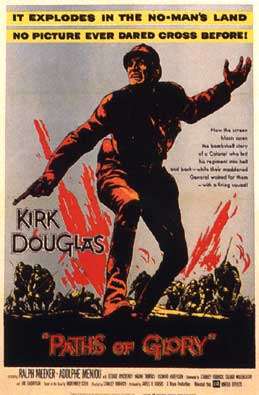Paths of Glory

Paths of Glory is one of Stanley Kubrick's earliest films, and also one of his most critically acclaimed. A French general during World War I, seeking a promotion, orders a hopeless attack by his depleted division against a strongly fortified German position. When the attack quickly fails with heavy losses, the enraged general tries to shift the blame for the loss to his soldiers and orders three men to be tried under penalty of death for cowardice, opposed only by his subordinate Colonel Dax, who seeks to save the lives of his men.
- Affably Evil: Right until the very end, General Broulard comes across as a kindly old man, even as he's waxing philosophical on the merits of shooting a man every once in awhile to enhance morale.
- Aristocrats Are Evil: The two primary villains are aristocratic officers living far from the front lines in luxurious surroundings, showing little care for the lives of the men under their command.
- Armchair Military: General Mireau is one of the worst.
- Blackmail Is Such an Ugly Word
- Colonel Badass : Colonel Dax. Admittedly, this isn't an action movie, but Dax shows that he is fearless, either when he leads men on the battlefield, or when he confronts and expresses his disagreement to his superiors. Near the end he openly expresses his disdain at the face of general Broulard.
- Dirty Coward: Lieutenant Roget.
- Downer Ending
- Evil Versus Evil : Related to the overall anti-war message of the movie. The French generals are portrayed as hypocrites with little (if any) regard for the lives of their soldiers, and one assumes the generals of the opposing side (the Germans) being similar.
- A Father to His Men: General Mireau puts on an elaborate show about this in the beginning when asked to attack the Anthill, but quickly changes his tune when the possibility of promotion comes up. He's a hypocrite. Colonel Dax plays it completely straight, however.
- Glamorous Wartime Singer: Subverted, in that the beautiful girl who sings the song is a terrified German captive, and she sings a sad folk song about love in war.
- Glory Hound
- Kangaroo Court: The court-martial is pretty much this.
- Meaningful Name: During the taking of the anthill, Mireau orders a commander to start firing on the troops that aren't leaving, but he refuses without written order. The guys name? Captain Rousseau.
- In the original script, it was reversed. It was the general who was named Rousseau, while the battery commander was named Pelletier.
- Moral Myopia: Broulard, taking the suggestion of having to shoot one hundred enlisted men for cowardice very casually, becomes visibly angry at the suggestion of executing a single officer.
- The Neidermeyer: Lieutenant Roget is seen by at least two of his men as a coward and a drunk.
- General Mireau, likewise, comes across as someone completely disconnected from the reality of the war he's asking his men to fight, when he reviews the trench troops to "boost their morale."
- Not Even Bothering with the Accent: The movie centers entirely on the French army, but (probably wisely) the primarily American and English actors don't even try to change their normal accents.
- Rated "M" for Manly: While Colonel Dax reviews his troops before the attack, enemy shells detonate less than 10 yards away from the trench. He doesn't even flinch. Then when he blows the whistle to go over the top and advance across the No-Man's Land, he's out in front leading the way with enemy bombardment and machine-gun fire going off on all sides. Grrrrrr.
- Shot At Dawn
- Silly Rabbit, Idealism Is for Kids: Broulard gives Colonel Dax a lecture to this effect near the end.
General Broulard: Colonel Dax, you're a disappointment to me. You've spoiled the keenness of your mind by wallowing in sentimentality. You really did want to save those men, and you were not angling for Mireau's command. You are an idealist - and I pity you as I would the village idiot.
- Truth in Television: Not that every general was this bad, but a lot of the Aristocrats Are Evil trope was a pretty accurate portrayal of the French high command - so much so that the army had to deal with mass mutinies of their soldiers during portions of the war. The British and German general staffs were a little bit better, but not vastly so.
- Unflinching Walk: A variant. As Colonel Dax inspects his men before assaulting the Anthill, the enemy is bombarding their trench. Shells are exploding -- loudly -- less than 20 feet away from him. Yet, he calmly continues walking past his troops without so much as a twitch when each blast goes off.
- War Is Hell
- We Have Reserves: In order to 'encourage' a company of men who aren't advancing, General Mireau orders his artillery to bombard his own trenches.
- World War I